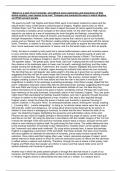“Nature is a part of our humanity, and without some awareness and experience of that
divine mystery, man ceases to be man” Compare and contrast the ways in which Hughes
and Plath present people
The poems by both Ted Hughes and Sylvia Plath seem to be heavily inspired by nature and the
natural world, many of their poems using this type of imagery. Hughes’ poems such as ‘Wind’,
‘October Dawn’ and ‘The Horses’ often seem to depict the power of nature against humanity, and
how humanity’s mortality cannot compare to the natural world. On the other hand, Plath may be
argued to use nature as a way of expressing her inner thoughts and feelings, connecting the
natural world to the intrinsic nature of humans, and showing our ‘awareness and experience’
through introspection. However, both poets depict a sense that ‘nature is part of our humanity’,
poems such as ‘Wodwo’ and ‘The Stones’ creating striking images of a connection with the natural
world. Therefore, in relation to the quote, it seems that both poets do explore the idea that people
have ‘some awareness and experience’ of nature, and it is that which helps us to form as people.
Firstly, the idea is created by both poets that a natural battle between nature and humanity seems
to occur and that nature holds power and authority over humans, being thousands of years old,
whilst humanity are almost temporary beings. This is depicted heavily in Plath’s ‘The Hermit at
Outermost House’ as religious imagery is used to imply that nature has almost a ‘god-like’ status.
The speaker states, “The greats gods, stone-head, claw foot” implying that the rock formations that
they observe in the landscape seem to tower over the earth, seemingly terrifying, and they make
people worship the landscape. Furthermore, the vocative ‘despots’ highlights the power that they
must hold, as it is similar to a dictator, again showing the authority that nature has over humanity.
The fact that they are ‘old despots’ also adds weight to this idea as it gives them an ancient quality,
suggesting that they will last for years longer than humanity and therefore there is nothing a human
could do to combat that. This poems begins with the line “Sky and sky, horizon hinged”, the
imagery creating a picture of the vast nature and how the man in the poem is minuscule and
insignificant in relation to the seemingly everlasting landscape. Critic Edna Longley stated that this
poem “celebrates masculine values that defy the elemental Gods” perhaps suggesting that through
this work Plath was trying to demonstrate the narcissistic attitude of man, the idea they they
believe themselves to be equal to the gods of nature, something comical. Perhaps this could have
been reference to the quite dominant, chauvinistic nature of her husband, Hughes. Thus, this poem
might show Plath expressing her feelings towards Hughes, and man in general, through the power
of nature in relation to the insignificance of man. However, this idea is also depicted through
Hughes’ poetry, except he shows the power of nature over humanity in general, focusing of
nature’s violence. In his poem ‘Wind’, he anthropomorphises nature, showing the “woods crashing
[…] burning hills […] winds stampeding”. In doing so, he almost makes nature seem like a pack of
wild animals, violent and dangerous, not caring about what is being destroyed by its actions. In
relation to how nature is damaging to humanity, he states that the wind “dented the balls of my
eyes”, the disturbing imagery highlighting the gruesome and authoritative nature of the wind.
Plosives are also used by Hughes perhaps to demonstrate the anger of nature, as the “back gull
bent like an iron bar”. By using the plosives in accordance with the metallic imagery of the ‘iron bar’
it shows the strength of the wind and how humanity doesn't stand a chance, because at this point
nature is even starting to destroy itself, the gulls being the first victims. The subtle references here
to the eventual extinction of humanity is also referenced in ‘October Dawn’ as the speaker states
that “mammoth and sabre-tooth celebrate”. By using extinct animals here, it seems that perhaps
Hughes is suggesting a subversion of life and death, that these animals, that were once enemies,
will come together to celebrate the extinction of humanity, just as early humans caused their
extinction. Once critics said that Hughes often uses “violent, elemental energies of nature” which
seems relevant to these poems in which he uses the destructive power of nature and the elements
to reflect nature’s violence and authority. Therefore, through the use of nature in their poetry, both
Hughes and Plath show that ‘people’ are inferior to nature and that nature holds some sort of
ancient authority over humanity in general.
Another way in which the poets present people is through the idea that nature is ‘a part of our
humanity’ and that there is something within us that is intrinsically connected to the natural world.
In ‘Wodwo’ Hughes seems to demonstrate this idea well as a ‘wodwo’ is a creature that is




